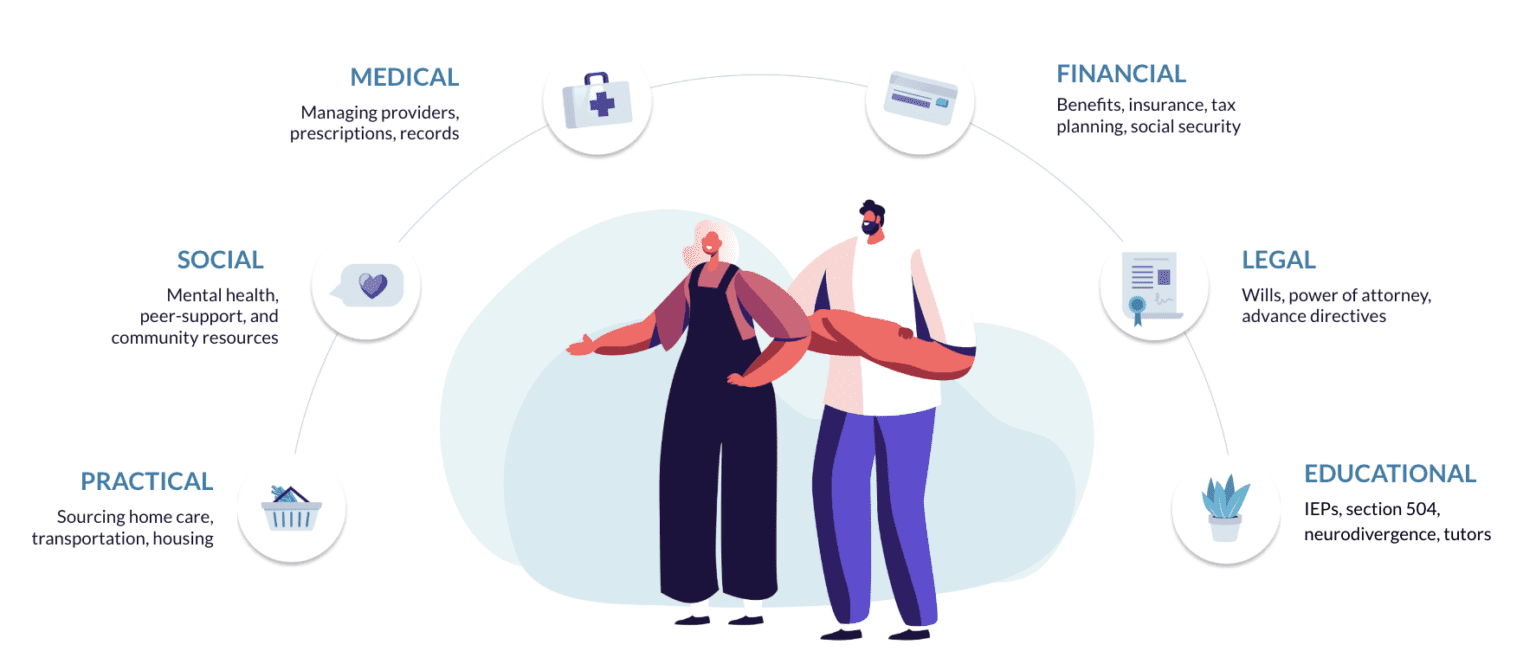2024 Employee Leave Trends Report
Read the latest research behind employee absenteeism, paid leave, and how companies are addressing rising concerns.
Learn how social care can enhance existing benefits, streamline solutions, and support employees and their families through challenging times.

Volatile market conditions. Economic uncertainty. A divisive election cycle. Expanding roles at work and home. Employees are under a lot of pressure, causing downstream impacts to physical and mental health and sometimes their ability to remain present and productive at work. Concurrently, HR decision-makers are facing their own set of challenges, being asked to do more with less, to support a changing workforce with a diverse set of needs, while cutting costs.
Enter social care.
Social care is a wrap-around support model that complements medical care. It offers respite to employees and employers stretched too thin—serving as the connective tissue that brings benefits and resources together into a unified approach. It uncovers holistic solutions to personal and family challenges that extend beyond physical and mental health. Solution related to housing to finances, education, legal needs, caregiving needs, and more. Implemented well, it can help reduce the number of point solutions that employers need to manage, increase the use of those that are delivering the most value, and improve the ROI of benefit offerings.
This article covers four reasons employers should evaluate adding a social care management solution into their benefit offerings. Now—not later— is the time to support employees and their loved ones.
One has only to pick up their phone to know that we’re living in some pretty stressful times. A recent report by Deloitte reveals that 49% of employees feel regularly stressed. Over the last several years, employees have weathered a pandemic; shifting work conditions and requirements; economic and political crises; and the list goes on. The impacts of these stressors are evident in the rising mental health needs of employees. Seventy-seven percent of large employers reported a 33% year-over-year increase in the Business Group on Health’s 2024 Large Employer Strategy Survey, leading to an 8.4% jump in healthcare spending.
Employers are prioritizing employee mental health benefits, with 36% calling it a top healthcare initiative for 2024. However, many are applying a one-size-fits-all approach, which may not address the root causes of chronic stress. A social care management solution combines local support and resources to make a plan based on everyone’s needs and abilities – loved one and caregivers, offering a greater chance of long-term success.
One of the most prevalent root causes of employee stress stems from balancing the responsibilities of work with those of caring for family members. The Anxiety and Depression Association of America reports this burden is a significant cause of mental health issues:

Nearly three in four employees have caregiving responsibilities for a loved one and this number is expected to increase. By 2034, seniors will outnumber kids in the United States. Chronic illness, comorbidities, and disability are on the rise. In 2020, employee caregivers spent an average of 9 hours per week providing care. In 2023, that number nearly tripled to 26 hours.
Social care addresses the three components that are most challenging for employee caregivers, The emotional toll of caregiving, knowing what to do, and the intense time requirements of caring for loved ones. The assistance of a trained expert helps employees better understand and utilize all of the resources available to them. They also come up with a comprehensive plan that meets their family care needs.
Employers are trying to meet employees where they are, offering an increased number of benefits, including mental health solutions, back-up childcare, and more generous leave policies. And yet, employees are still struggling. Why? In part, it may be because they simply don’t know what resources are available to them.
A survey of 1,600 employees and HR professionals by provider One Medical found that only 19% of employees used their available benefits in 2022. Employees are typically presented with their available benefits once, or maybe twice a year. Beyond their basic health, dental, and vision insurance, they may not even know what they have or where to find it.
Furthermore, their benefits may include a series of specialized solutions that aren’t always the best approach to solving multi-faceted challenges. Complex family needs require holistic solutions that consider the whole person and what their life is like outside of work. They should also consider their practical needs, financial concerns, legal and educational responsibilities, and more.
A social care solution offers employees access to a licensed clinical social worker to help develop and act on a plan, along with digital tools, education, and peer support. It helps them navigate the complexities of finding and engaging the right resources for their unique needs. This is where most benefit offerings fall short.
Adding benefits doesn’t always result in better outcomes. Better outcomes are achieved by having the right support delivered at the right time.
More than half of employers report having 4-9 point solutions, some even up to 12. These benefits, as valuable as they are, are often underutilized. It’s a catch-22. Employees fail to grasp the scope and take advantage of the support they actually have. Also, organizations lose out on promised savings from efficient utilization of the various point solutions they’ve purchased.
Social care offers personalized interventions that combine use of existing employee benefits, community resources, and more. These may encompass mental health, financial wellness, legal support, backup care, specialty care, meal planning, estate planning, and home care.
At Grayce, our clients report a 58% increase in appropriate benefit utilization. Docusign reported that, with the introduction of Grayce, appropriate utilization of backup care grew by 23x and its mental health solution’s utilization doubled. Read the full Docusign case study here.

At the same time, social care presents employers with a unique opportunity to streamline benefits like EAPs. A short-term, time-bound solution, EAPs provide employees with a limited and often outdated set of referrals, and rely on the employee to do all the heavy lifting and follow-through. It’s no surprise that they too are underutilized despite the need.
A true social care offering, like what we offer at Grayce, is personalized to the care needs of the individual and their loved ones. Our care navigation platform offers access not to a coach, but a Master’s-level licensed clinical social worker, who works to understand their needs and pull in resources. In addition to live conversations with a real, empathetic, and knowledgeable human, employees and their loved ones get access to the Grayce app. With it they can find educational resources, get support from communities of peers, and ask experts questions.
Employees with Grayce say they feel better supported (85%), they’re more likely to stay at their jobs (85%), and they enjoy renewed focus (70%). Want to learn more about how Grayce can help you better support your employees, while maximizing the ROI of your benefits offerings? Talk to our team.
Please share your information and we will contact you to schedule a conversation.

Sign up to receive the latest resources and updates from Grayce.